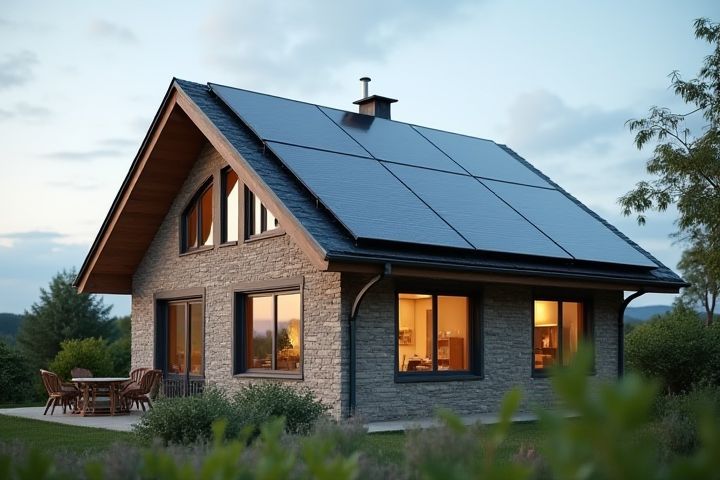
Yes, a house can indeed have solar panels installed, transforming sunlight into electricity for residential use. These photovoltaic systems consist of solar cells that convert solar energy into usable power, significantly reducing your energy bills and carbon footprint. Various types of solar panels, including monocrystalline and polycrystalline, cater to different budget and efficiency needs. Additionally, many regions offer incentives, such as tax credits or rebates, to encourage homeowners to adopt solar energy solutions. By integrating solar panels, you not only contribute to environmental sustainability but also increase the value of your property.
Can A House Have Solar Panels
Roof condition
Your roof's condition is crucial for installing solar panels effectively. A well-maintained roof, ideally with a lifespan of at least 20 years, provides a stable foundation for solar arrays, preventing costly repairs later on. It's essential to check for leaks, structural integrity, and the angle for optimal sunlight exposure, with a pitch of 30 degrees often recommended for maximum efficiency. Investing in a roof inspection prior to installation can ensure the longevity and effectiveness of your solar energy system.
Sunlight exposure
A house can benefit significantly from solar panels, especially when installed in areas with optimal sunlight exposure. Ideally, solar panels perform best with a minimum of 5 to 7 hours of direct sunlight daily, maximizing energy conversion. South-facing roofs are generally the most effective locations, as they capture sunlight throughout the day. If your home is in a region with ample sunshine, you could potentially reduce your electricity bills by 30% to 50% by harnessing solar energy.
Local regulations
Local regulations regarding the installation of solar panels on houses vary significantly by jurisdiction. Homeowners typically need to comply with building codes, zoning laws, and possibly neighborhood association guidelines that dictate where and how solar panels can be installed. In many areas, obtaining a permit is essential, which may involve submitting plans for review to ensure they meet safety and aesthetic standards. Before installation, check your local government's regulations to understand any restrictions or incentives, as some regions offer tax credits or rebates for renewable energy installations.
Installation costs
The installation costs of solar panels for your house can vary significantly, typically ranging from $15,000 to $30,000 before any tax credits or incentives. Factors influencing these costs include the size of the system, the type of solar panels selected, and the complexity of the installation, which can include roof type and structural considerations. On average, homeowners can expect to pay around $3 to $5 per watt for system installation, including labor. Federal tax credits and local incentives can reduce upfront expenses by up to 30%, making solar energy a more affordable option in the long run.
Energy needs
Installing solar panels on your house can significantly reduce your energy needs by harnessing renewable sunlight. On average, a typical residential solar panel system can produce between 250 to 400 watts per panel, contributing to a significant portion of your electricity consumption. With the right system size and local climate conditions, homeowners can expect to meet 70% to 100% of their energy needs, depending on the installation and energy usage. Additionally, solar power can lead to substantial savings on electricity bills, with reductions of up to 30% or more annually.
Roof orientation
The roof orientation of a house significantly affects the efficiency of solar panel installation. South-facing roofs in the Northern Hemisphere receive maximum sunlight exposure, making them the most ideal for solar energy production. In contrast, east and west-facing roofs can still generate electricity, but at a lower capacity, with an estimated reduction in energy output of 10-20% compared to south-facing roofs. A roof pitch of 30 to 45 degrees can further optimize energy collection by allowing panels to capture sunlight more effectively throughout the day.
Incentives and rebates
Installing solar panels on your house can significantly reduce energy costs, with state and federal incentives available to maximize savings. In 2023, the federal solar tax credit allows you to deduct 30% of the installation costs from your federal taxes, which can lead to substantial financial relief. Furthermore, various states offer additional rebates and performance-based incentives, with some programs providing up to $2,000 back for qualifying installations. These financial incentives not only enhance the return on investment for solar systems but also contribute to a sustainable energy future.
Maintenance requirements
Solar panels require minimal maintenance to ensure optimal performance, typically needing a thorough cleaning every 6 to 12 months to remove dirt and debris that can block sunlight. Additionally, regular inspections should be conducted annually to check for any signs of wear, damage, or loose connections, helping to extend the lifespan of the system, which can exceed 25 years. Monitoring the energy production can also alert you to potential issues, with most systems equipped with performance tracking software. Ensuring that surrounding vegetation is trimmed can prevent shading, thus enhancing your solar panel efficiency.
Home insurance implications
Installing solar panels on your house can potentially affect your home insurance policy. Many insurers may adjust your premium, as solar panels increase the overall value of your home, typically by 3-4%. It's crucial to inform your insurance provider about the installation, as some policies may specifically cover solar systems or offer discounts for renewable energy upgrades. Notably, you should also consider any potential liabilities or damages linked to the solar panels, ensuring that your policy adequately covers these factors.
Warranty and lifespan
Solar panels typically come with a warranty of 25 years, although some manufacturers offer extended warranties up to 30 years. During this period, many solar panels maintain at least 80% of their original efficiency, ensuring a significant return on investment. The lifespan of quality solar panels usually ranges between 25 to 30 years, with some systems even lasting up to 40 years with proper maintenance. Investing in solar panels for your house not only reduces electricity costs but can also enhance your property's value over time.
